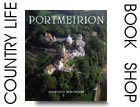Book Review: Portmeirion
Sir Roy Strong is enchanted by a beautifully written account of Portmeirion, a captivating, romantic place born of one man's vivid imagination


Portmeirion, Jan Morris, Alwyn W Turner, Mark Eastment, Stephen Lacey and Robin Llywelyn, Foreword by Jools Holland (Antique Collectors Club, £25)
I don't know of anyone who hasn't been enchanted by Portmeirion, that act of architectural madness perpetrated by Sir Clough Williams-Ellis on the coastline of North Wales. I came to it first in the late 1970s when I needed to recuperate and have my spirits lifted from the traumas of those union and strife-ridden years. From the moment I entered this petite ville imaginaire, I was captivated. I still am.
This is a splendid book with all the right people contributing: who could go wrong if they had Jan Morris among their contributors? Her account sparkles with affection and wonder at this architectural aberration. Her contribution, and that of others, makes it clear that Portmeirion is about one man, Clough, someone who was a mass of contradictions, like so many do-gooding members of the Edwardian upper classes. Through his wife Amabel, a Strachey, he was drawn into the Socialist orbit of the kind who spoke and wrote of equality, but couldn't live without servants. All very Bloomsbury.
It is important to bear in mind his birth date, 1883, as his intellect and visual perception were formed before 1914. In one way, Portmeirion was the last of those picturesque villages built by landowners, who were less interested in the welfare of their tenants than the desire to ride by something pretty to look at.
In Clough's case, landed gent though he was, this could only be achieved by making it an exclusive holiday resort, extending its delights later to day-trippers. It is a quintessentially between-the-wars vision, most of it 1926?39, one shared by the likes of Rex Whistler, Cecil Beaton and Frederick Ashton. They all wanted to be part of the brave new, emancipated world of the 1920s, but, simultaneously, there was a mourning and fascination for the aristocratic world that had gone.
Portmeirion is a one-man Ruritania, a princedom whose subjects were holiday-makers. It brings together all that romance with the past which flourished in the years after World War I: the love of the 18th century; of continental Baroque and rococo; a nostalgia for 'ye mansions of Englande in ye olden tyme' interspersed with little houses painted pink and yellow, which might have been lifted from a Cornish fishing village.
We owe much to Clough for his passionate advocacy of national parks, his denunciation of ribbon development, the desire to see fine old buildings protected from demolition, and a belief in the need for planning. Planning! What irony. If planning had existed in 1926, not a stone of Portmeirion would have arisen. There lies the rub.
Sign up for the Country Life Newsletter
Exquisite houses, the beauty of Nature, and how to get the most from your life, straight to your inbox.
This is a wonderfully presented book, beautifully illustrated. It pays Clough his full due, but equally does justice to his hugely talented daughter, Susan. Portmeirion pottery above all the delightful Botanic Garden pattern has taken the name of her father's creation around the globe. Portmeirion is a monument to Clough's belief in delight for all. And yet and this is the great paradox he was partly responsible for the ghastly new towns which arose after 1945.
Country Life is unlike any other magazine: the only glossy weekly on the newsstand and the only magazine that has been guest-edited by HRH The King not once, but twice. It is a celebration of modern rural life and all its diverse joys and pleasures — that was first published in Queen Victoria's Diamond Jubilee year. Our eclectic mixture of witty and informative content — from the most up-to-date property news and commentary and a coveted glimpse inside some of the UK's best houses and gardens, to gardening, the arts and interior design, written by experts in their field — still cannot be found in print or online, anywhere else.
-
 380 acres and 90 bedrooms on the £25m private island being sold by one of Britain's top music producers
380 acres and 90 bedrooms on the £25m private island being sold by one of Britain's top music producersStormzy, Rihanna and the Rolling Stones are just a part of the story at Osea Island, a dot on the map in the seas off Essex.
By Lotte Brundle
-
 'A delicious chance to step back in time and bask in the best of Britain': An insider's guide to The Season
'A delicious chance to step back in time and bask in the best of Britain': An insider's guide to The SeasonHere's how to navigate this summer's top events in style, from those who know best.
By Madeleine Silver